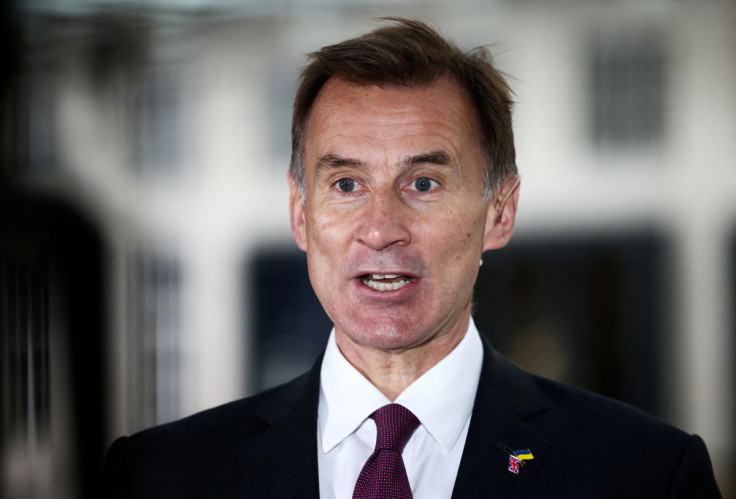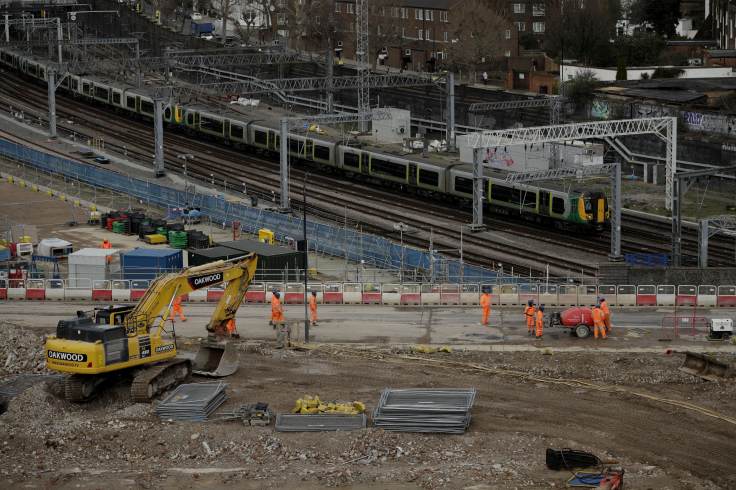Conservative Party Conference Overshadowed by HS2 Rumours
Chairman Jeremy Hunt has already signed off on "reallocating" money from HS2's northern leg to other transport projects, according to reports.

Jeremy Hunt yesterday confirmed workers will bag a £1,000 a year wage boost as he admitted taxes are "too high" in Britain.
In a major speech on the second day of the Tory Conference in Manchester, the Chancellor also vowed to reinvigorate the economy by cracking down on benefits "shirkers" and shrinking the size of the civil service.
Mr Hunt's promise to hike the national living wage to £11 per hour means full-time workers will see their annual earnings rise by at least £1,000 next year.
The Chancellor told a room of card-carrying Conservatives: "Today I want to complete another great Conservative reform, the national living wage."
"We promised in our manifesto to raise the national living wage to two-thirds of median income - ending low pay in this country."
The national living wage – as it has been officially called since 2016 – is the lowest amount workers aged 23 and over can be paid per hour by law, and is currently £10.42 an hour. There are lower rates for younger workers.
The rates are decided each year by the government, based on the advice of an independent advisory group, the Low Pay Commission. Ministers generally accept the commission's recommendations.
The move is expected to impact two million workers.
However, the announcement came after Hunt refused to commit to slashing rates ahead of next year's general election, to the bitter disappointment of backbench Conservative MPs.
The Chancellor said: "Conference, when we halve inflation, that's not just a one per cent income tax cut, that's a five per cent boost to incomes compared to if it stayed the same."
Last week, The Bank of England held interest rates at 5.25 per cent after a close-running vote opted against a 15th increase in a row.
Interest rates have been rising consistently since 2021, in an attempt to combat inflation, and are currently at their highest level for 15 years.
Sunak promised at the start of the year that he would "halve inflation"; it would have to fall to about 5.3 per cent in December to meet that target.
In March, he unveiled a budget aimed at tackling a cost-of-living crisis — which has sparked strikes as many wages fail to keep pace.
The past year, soaring prices have caused a cost-of-living crisis to run rampant across the UK, with rising food and energy bills contributing to record-breaking inflation levels.
Mr Hunt promised to get spending on public services under control so the economy can stabilise and tax cuts can eventually go ahead.
One money-saving strategy Hunt alluded to was a reduction in civil service numbers. To reduce spending and save a whopping £1 billion, the Chancellor pledged to impose a hiring freeze on the civil service.
According to Hunt, "woke equality and diversity roles" will be first in line for the chopping. He said: "The Treasury needs to change its focus from short-term cost control to long-term cost reduction and we're going to start with the civil service."
"I'm freezing the expansion of the civil service and putting in place a plan to reduce its numbers to pre-pandemic levels."
Finally, Hunt also pledged new changes to the benefit sanction system in his speech, as the government looks to make savings on its welfare bill.
The Chancellor warned that the system is heading in the "wrong direction" since the pandemic in getting people clocking on.
He said that 100,000 people a year were moving off work into benefits "without any obligation to look for work", leaving people isolated.
Hunt stated: "We have got a system which is too focused on process and not enough on outcomes. The outcome that we should be looking for is one where dramatically fewer people are permanently signed off having to look for work because that isn't a good outcome for them and it's not a good outcome for the economy."
This move, says Hunt, would help increase productivity by 0.5 per cent, paving the way for tax cuts.

Despite these announcements, yesterday's party conference was largely overshadowed by swirling rumours of what now appears inevitable – the cancellation of the Birmingham to Manchester leg of HS2.
The Independent first revealed secret talks between Rishi Sunak and Jeremy Hunt about axing the line last week.
And now reports suggest Hunt has already signed off on "reallocating" money from HS2's northern leg to other transport projects, a decision set to spark fury among northern business leaders, MPs and mayors.
The prime minister believes the rationale for HS2 is based on "old assumptions" and will abandon plans to build the line between Birmingham and Manchester.
Instead, the money the government would have to spend on the northern leg — about £36 billion — will be reinvested in the Midlands and the north. But much of this money is not scheduled to be spent until the 2030s, limiting Sunak's room for immediate giveaways.
However, following intense cabinet lobbying, he is expected to say that the line will terminate at Euston in central London rather than Old Oak Common in west London.
He is also expected to commit to a high-speed rail link between Manchester and Leeds.
The move has been opposed by a succession of senior Tories, including three former prime ministers — Boris Johnson, Theresa May and David Cameron. They have raised concerns that it will undermine the party's commitment to levelling up, with Johnson describing the plans as "insanity".
Sunak is intent on scaling back the line, however, with internal estimates suggesting that the cost of the project has ballooned from £30 billion when it was first announced to more than £100 billion.
Mr Hunt failed to address the project's future in his speech and his team attempted to play down the story, although he did say: "We do have to answer the question as to why it costs ten times more to build high-speed rail in this country than across the Channel in France, because it is taxpayers' money."
Minutes before the Chancellor took to the conference stage, hundreds of free-market Tories gathered in a separate, packed-out function space in Manchester's Midland Hotel to hear Liz Truss urge Rishi Sunak to slash taxes.
The ex-PM didn't hold back as she pleaded with ministers to "make Britain grow again".
Ms Truss said: "Let's stop taxing and banning things," she told the packed room.
"Let's instead build things and make things. Let's be prepared to make conservative arguments again, even if it's unpopular, even if it's difficult. I want everybody in this room to unleash their inner conservative."
"And finally, my friends, let's make Britain grow again," Ms Truss concluded.
© Copyright IBTimes 2025. All rights reserved.






















